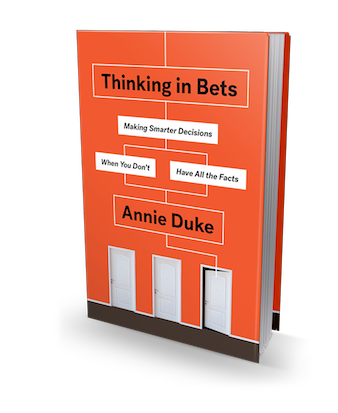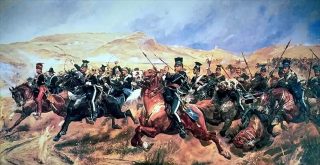Every decision we make is a bet. A bet is essentially an investment in a future outcome that is uncertain. That investment could be money, time, attention or some other resource. When we think of decisions as bets, we are more likely to think probabilistically, adopt an open-mind, consider diverse options and learn from our mistakes.
If every decision is a bet, then we can learn to become better decision makers by studying the ultimate betting game: poker. People often compare life to chess. (We’ve all heard the expression “so-and-so is playing chess while everyone else is playing checkers”). Annie Duke, a former National Poker champion and author of Thinking in Bets, claims the better analogy is poker:
“Chess contains no hidden information and very little luck. The pieces are all there for both players to see. Pieces can’t randomly appear or disappear from the board or get moved from one position to another by chance…Poker by contrast is a game of incomplete information. It is a game of decision making under uncertainty over time…. Valuable information remains hidden. There is also an element of luck in any outcome.”
She makes a great case. Here are five principles that Annie Duke shares from her professional poker experience, and graduate work in psychology, that will improve decision making.
1. A bad outcome is not the same thing as a bad decision. The inverse is also true, a good outcome is not the same thing as a good decision. Decision outcomes are determined by a combination of skill (decision quality) and luck. The problem is we often ignore the role luck plays in any decision outcome and fall prey to Hindsight Bias. This is the tendency, after an outcome is known, to see the outcome as being inevitable. It happens all too often. We have a natural tendency to judge the quality of a decision entirely by the quality of its outcome. When my beloved Seattle Seahawks lost the Super Bowl with an ill-timed pass play at the goal line that was intercepted, I joined the chorus in condemning the decision as the “worst play in Super Bowl history.” Yet Annie Duke makes a great case for why the decision was actually sound. A better judgment of the call is to describe it as “the worst result of a call ever,” which is exactly how Pete Carroll, the Seahawk coach, described it in a post-game interview. Poker players have a name for this; Resulting. The very best poker players guard against it, and we should too. When assessing a decision, consider the decision process and all the analysis that went into that decision. The outcome doesn’t tell us the whole story.
2. Get comfortable saying “I’m not sure.” Humans don’t like uncertainty and our natural tendency is to resist it. One way this plays out in organizations is a strong pressure for people to “feel certain” before they move forward with a decision. In reality, we are much better off if we accept the uncertainty by acknowledging that our state of knowledge is not complete. Great poker players, like great decision makers, accept that they can never be 100% certain how things are going to play out. “They embrace that uncertainty,” says Annie Duke, “and instead of focusing on being sure, they try to figure out how unsure they are, making their best guess at the chance different outcomes will occur. The accuracy of those guesses will depend on how much information they have, and how experienced they are at making such guesses.
3. Think in probabilities. If the future is uncertain, then we should approach decisions, and even our beliefs, through the lens of probability. Another way to think about this is to avoid black-and-white thinking, where a given belief or outcome has a probability of either 0% or 100%. Annie Duke elaborates; “We would be better served as communicators and decision makers if we thought less whether we are confident in our beliefs and more about how confident we are.” This approach to decision making creates open-mindedness. We are more accepting of information that disconfirms our beliefs. The goal is to have the best outcome, not to be “right.” By thinking probabilistically we treat information objectively and are quicker to course correct and learn from mistakes.
4. Find a Truth-Seeking Group. Having a group of trusted peers is important, but all groups are not created equal. To improve our decision making, we need intellectually diverse colleagues who think independently, seek the truth, share their opinions and provide candid feedback. The key here is to avoid confirmatory thought which generally leads to rationalizing predetermined decisions (confirmation bias), and to seek exploratory thought which encourages open-mindedness, alternative hypothesis and constructive dialogue. When Annie Duke played professional poker she surrounded herself with a group of professionals who could help her objectively analyze her play and improve. “We don’t win bets by being in love with our own ideas. We win bets by relentlessly striving to collaborate our beliefs and predictions about the future to more accurately represent the world. In the long run, the more objective person will win against the more biased person.” (Phil Knight had a similar group trusted confidants at Nike called The Buttfaces which I wrote about here).
5. Allow “Future You” to Weigh in on Your Decision. Annie Duke calls this Mental Time Travel, and by recruiting future versions of yourself to have a voice in your present-day decision, you’ll make better decisions for the long-run. This technique will counter what researchers call Temporal Discounting, the tendency to take irrationally large discounts to receive a payoff today instead of waiting for a larger payoff later. Before committing to a future decision, consider whether Future You will regret the decision.
Thinking in Bets is an excellent complement to the Undoing Project by Michael Lewis and Thinking Fast & Slow by Daniel Kahneman. As an ensemble, these three books provide a great introduction to improving decision making.
About the Author
Sean P. Murray is an author, speaker and consultant in the areas of leadership development and talent management. Learn more at RealTime Performance.
Follow Me on Twitter: @seanpmurray111
Join my mailing list and be updated when I publish new articles.


